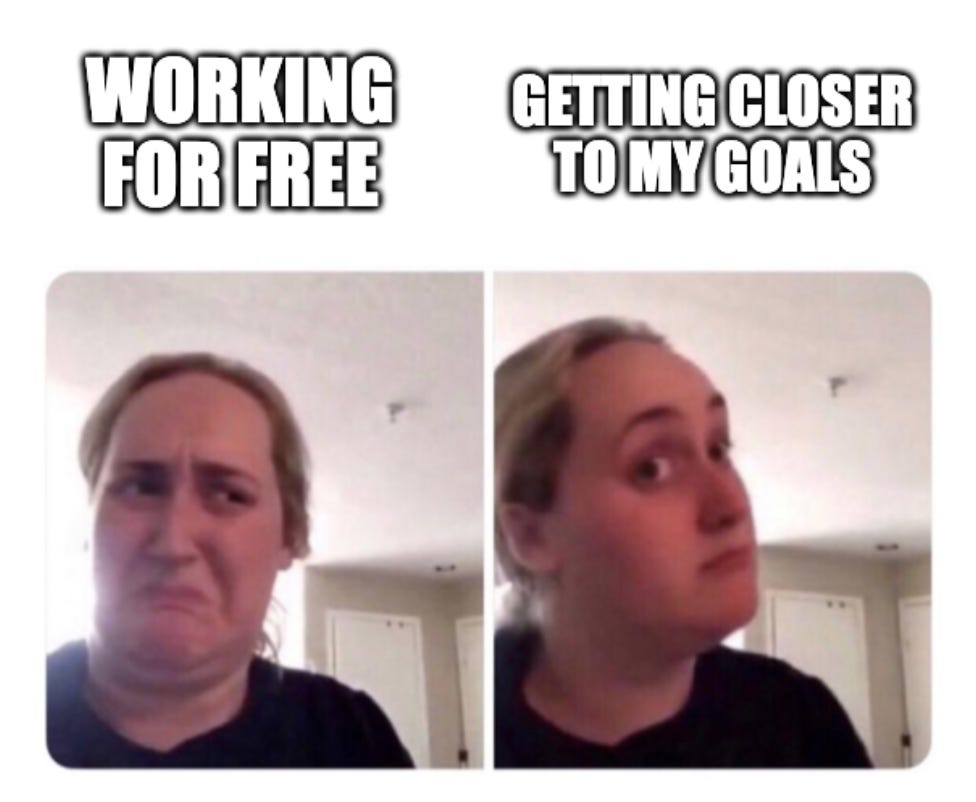I was chatting with an entrepreneur friend this week, and she shared a story that left me shaking my head in disbelief. But gave me a great idea for this week’s post.
Two well-known, well-positioned brands approached her for help with a project. They recognized her as an expert in her field, but when she mentioned preparing a dossier and a budget, they acted like she was completely out of place.
These big brands expected her to work for free—her time, her knowledge, and even the time of others needed for the project.
Sounds ridiculous, right?
Unfortunately, this happens far too often, and it feels especially insulting when big companies pull this stunt. As solopreneurs, we need to be prepared to tackle these situations and turn them to our advantage.
Common excuses for free work
When people approach you to do work for free, these are the most common excuses we hear:
"This will give you a lot of visibility."
"We’ll work with you again in the future."
"If we get money from the project, you’ll get some of it."
"We’ll connect you with people you want to be connected with."
"We’re a startup and don’t have money, but you’ll gain a ton of experience."
I’ve heard them all, and I’m sure you have too. But I know it is sometimes difficult to say no, so let’s remember…
Why you shouldn't work for free
As a general rule, there are several valid reasons why you should not work for free:
Value your expertise: Your skills, knowledge, and time are valuable. When you give them away for free, you devalue your work and set a precedent that your services aren't worth paying for.
Sustainability: Consistently working for free isn’t sustainable. You have bills to pay and a business to run. Free work doesn’t contribute to your bottom line.
Respect and boundaries: By setting clear boundaries and refusing to work for free, you establish respect with clients. They understand that your services come with a price tag, reinforcing the value of your expertise.
Opportunity cost: Time spent on free work is time taken away from paid opportunities or developing your business.
When free work might make sense
“Didn’t you just say I shouldn’t work for free?!?!” Yes, yes, but hear me out.
Sometimes, these offers can be beneficial, especially when you’re starting out in a new industry or career. I’ve been there myself many times—most recently when I was new to Web3 and now with my F1 content career.
While it’s important to avoid working for free as a rule, there are strategic exceptions. However, it's crucial to know where to draw the line and when to politely decline:
Entering a new market: When breaking into a new industry, offering your services for free initially can help you build a portfolio and gain testimonials. I have done this several times, and it’s worked wonders. However, this doesn’t mean you should say yes to working for free for anyone who comes knocking.
Building relationships: If a potential client has a lot of influence or connections in your field and you feel that doing a small project for free might lead to bigger opportunities, then go ahead and do it.
Skill development: If a project offers you the chance to develop new skills, work with new technologies, or gain experience in new environments, consider it. This could propel your career and the success of your business.
Tips for handling free work requests
When an opportunity comes to your door without any monetary compensation, keep these tips in mind to consider whether it is worth taking or not:
🧐 Assess the request: Evaluate the potential benefits versus the costs. Will this opportunity genuinely help you achieve your goals?
🤝 Propose a compromise: Before saying yes to working for free, check if the client would consider a scaled-back version of your services or a deferred payment plan. Many professionals are willing to negotiate, so go ahead and do it.
⚖️ Offer alternatives: Suggest other ways they can support you, like referrals, testimonials, promoting your services to their network, or even bartering for goods or services. This way, you ensure that you gain something in exchange for your time and expertise.
🙏 Be firm but polite: Politely decline if the project doesn't align with your goals or values. You can say something like, “I appreciate the opportunity, but I can’t take on unpaid projects at this time.”
Final thoughts
Knowing your worth and setting boundaries around free work is essential for sustaining your business and maintaining your self-respect. Remember, your expertise and time are valuable, and you deserve to be compensated one way or another.
If the benefit skews significantly in their favor, it’s definitely not worth it.
Has this happened to you? How do you tackle these situations? Tell us in the comments below!
Until next time, keep shining and believing in your worth.
-Sabrina
🙋♀️ Before you go!!
If you liked what you read, please press the heart button and comment so I know it resonated with you. That will also help me reach a wider audience on the platform, and I’ll be forever grateful ❤️
And if you have your own publication on Substack and enjoy my content, please consider recommending my publication and adding a blurb. It will help other people find me and enjoy my posts like you do :)
⚡️About Sabrina Bonini
Sabrina Bonini is a content specialist, writer, and educator who thrives as a multi-passionate solopreneur. She’s currently creating content about Web3, new technologies, and Formula 1.
On a personal level, Sabrina writes the weekly publication ✍️ Diary of a Modern Solopreneur, bringing readers along on her solopreneur journey and sharing insights and lessons in hopes of empowering others on the same path.
When she’s not busy typing away, she’s picking up new hobbies, indulging her curiosity, or playing hide-and-seek with her fluffy cat. Discover more about her work and connect with her on LinkedIn.







